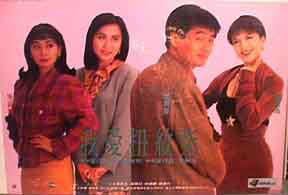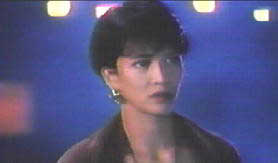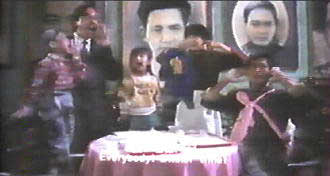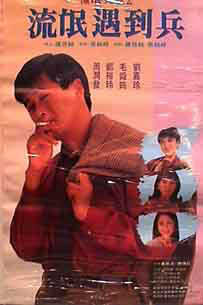Now You See Love . . . Now
You Don't!

Director: Alex Law
Year: 1992
Rating: 7.5
This very sweet
romantic comedy from Alex Law and Mabel Cheung gently explores the themes
of big city life versus small town living and the differing roles of men
and women in each venue. Though the film stretches its minimal plot perhaps
a bit long – a good fifteen minutes could have been edited out – there are
some truly wonderful little scenes that are often amusing and at times very
touching.
The cast assembled is terrific and much of
it was to reassemble a few months later for the classic action film Hard
Boiled. Chow Yun Fat, Anthony Wong and Teresa Mo show up and though Tony
Leung is nowhere to be seen his real life girlfriend Carina Lau is on hand.
The cast also includes one of HK’s best female comediennes – Do Do Cheng.
It is always a pleasure to see Chow in one of his comedy roles, but it was
particularly enjoyable watching the usually serious/psycho Anthony Wong do
a very laid back funny impression of a rural hick. Everybody is excellent
and the chemistry between the characters is very evident.

Chow is the village head (and very proud that he didn’t buy one of the votes
that elected him!) of a small rural village in the New Territories. His family
has lived there for many generations – as evidenced by his male ancestor picture
gallery in which everyone looks just like Chow! – and he is a very traditional
male. Women are for cooking, cleaning and babies. This is a place where the
men drink by the yard and in a later scene a city boy tells Chow “Shakespeare
said wine increases our desires in direct proportion to decreasing our potency”.
Chow scoffs at this with a “Shakespeare was a foreigner. They have more brains
than balls”

His girlfriend – Do Do Cheng – has been away in London for three years,
but Chow has waited for her all this time. When she returns though she is
a changed woman – decked out in punk fashion, holding modern attitudes and
swearing in a cockney accent.

Things do not go well between the lovers and Do Do is convinced by her friend
Teresa Mo to move to HK and get away from this small town thinking. Chow follows
her to HK and tries to convince her to come back and be a traditional wife.
She rejects this by exclaiming, “All men are alike. They want a car with
a spoiler. They want a spayed cat to catch mice. They want a woman to cook
and wash clothes. And to sleep on top of. I tell you, I don’t want any of
it, you son of a bitch”. This is all played out in a fancy restaurant in
which the staff (Do Do being one) sings Italian arias as they serve food and
drinks. Later there is a very funny parody of this back in the small town.
The film’s script is often terrific and has
some very clever dialogue and sayings throughout. The book “City on Fire”
mentions that much of the dialogue is in a dialect called Hakka and that
this may be the only film to ever use it.

After being rejected Chow decides to show her that he can be a modern man
and moves to HK with his friend Anthony Wong to set up a business in Central.
He takes up with a Christian evangelist – Carina Lau – while Do Do starts
going out with someone set up by Carina. All four of them (along with Wong)
go back to the village to celebrate the New Year and things come to a head
in a ludicrously absurd ending.

There are a lot of funny scenes that you think about later. One I particularly
liked for some reason is when Chow and Do Do’s lives are literally hanging
in the balance and they start sadly reminiscing about their past and Do Do
says she is sorry for never improving her three faults. Chow asks what they
are and she promptly gives the first two and then says she forgets the third.
With perhaps only minutes to live, Chow happily peppers her with numerous
faults for her to choose from.

There is never much doubt where this film is going (it was a Chinese New
Year offering which tend to have happy endings), but it takes its time and
is very amusing in getting there.









